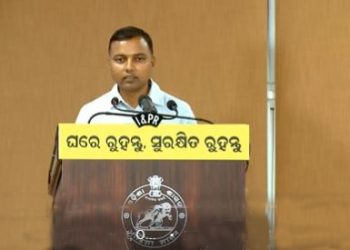Bhubaneswar: With the state capital observing steep surge in COVID-19 cases, the Bhubaneswar Municipal Corporation (BMC) Saturday shared the detailed strategies adopted by the civic body to contain the disease.
Briefing the media, BMC Commissioner Prem Chandra Chaudhary assured people that the spread of infection is under control in slum areas. As per the the ongoing active surveillance the number of COVID-19 positive cases are more from non-slum areas.
“Till now 418 positive cases have come from slum while 1,410 persons tested positive from non-slum areas in Bhubaneswar so far. We have formed a slum committee in each slum. Active contact tracing is being conducted successfully with active cooperation of committee members,” he said.
Stating that the civic body has ramped up its testing the positive cases have shot up, especially in slums. The BMC has now targeted 1400 tests per day and is reported to add five more RRT teams to setp up the effort
“Combined efforts of slum community and increased testing have resulted in detection of 41 positive cases Mahisakhala slum. The slum has been declared as containment zone. With this, the BMC has four slums in containment zones – Sitapur and Trinath Basti, Ganapati Basti in Nayapalli and Harinagar Basti,” the Commissioner said.
Home Isolation Encouraged
Meanwhile, promoting home isolation, Chaudhary said that the efforts are being made keep the COVID Care Hospitals or Centres reserved for critical patients. The BMC Commissioner also informed that 167 persons have been allowed to stay in home isolation in last ten days for patients residing in non-slum areas and having no co-morbid conditions with due procedure, and out of which 46 of them have recovered.
“Most of the time, asymptomatic persons don’t need any cure or treatment. In fact, 80 per cent cases from the city have been asymptomatic. However, if they show symptoms, there is a standard operating procedure (SOP) which includes calling the 1929 or 104 helpline or other contact numbers provided by the BMC. Only after inspection from Rapid Response Teams (RRTs) decision is made to shift them in a COVID care facility or in a hospital,” the Commissioner added.
He also mentioned that home quarantine was initially resisted by the denizens fearing social stigma and further spread. However, after being pursued by BMC volunteers and with training and orientation the move is now getting a good response.

